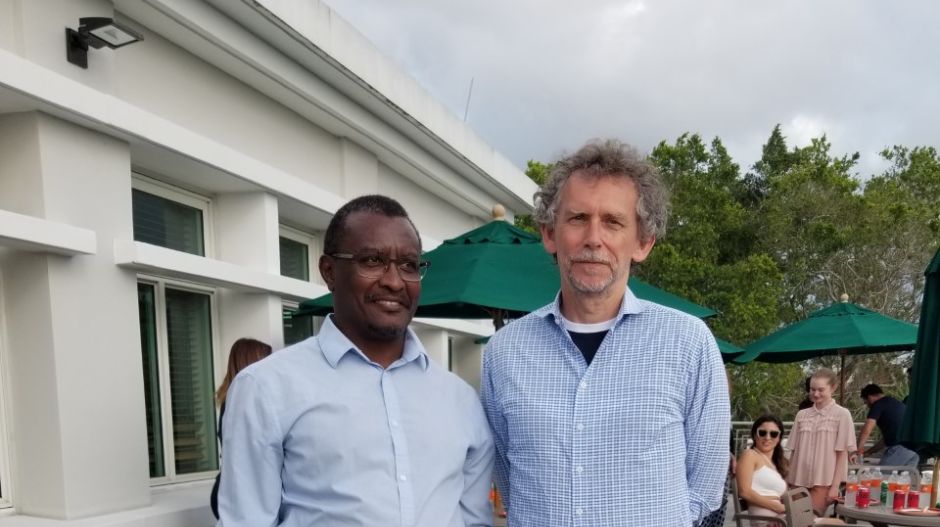I had the privilege, and the honor, of teaching in the White & Case International Arbitration program at the University of Miami Law School last month.
The students in my course on state responsibility, as well as my faculty colleagues, were all tremendous. Best of all, though, was meeting Elijah -- again.
Elijah Rukidi-Mpuuga is a Ugandan lawyer who previously practiced in Kampala, with an impressive reputation earned by representing individuals and businesses around the country. One of his specialties, he told me, was representing individual landowners, when local political and other figures sought to evict them from (and then take) their property.
Elijah’s work earned him the government’s enmity and he eventually came to the United States, and eventually Miami, several years ago, as a political refugee.
Elijah was a student in my course on State Responsibility in Miami. During an event with the class, I told Elijah that I had been to Uganda, albeit some years ago, in the mid1980s, as part of a 12-month hitchhiking journey across Africa following law school and clerkships (a last glimpse of freedom…).
Elijah asked me where I had visited, and I described traveling by train from the Kenyan border, headed west, to Kampala, the capital of Uganda. I also described traveling further east, to Kasese, on the border with Congo (then Zaire).
At the time, Uganda was in the midst of a long-running civil war and there were virtually no tourists or other foreigners in Uganda, much less traveling through remote rural areas by train.
Together with an (intrepid) friend, however, I was heading to the Ruwenzori Mountains, running along the border between Uganda and Congo and reputedly where the Nile first rises, for an extended hiking trip in some of the world’s most interesting terrain.
With a smile, Elijah asked what the train journey from Kampala to Kasese, back in the mid1980s, had been like. I said that it had been, well, eventful: Uganda was ruled by Milton Obote, whose repressive regime was supported by cadres of brutal North Korean military advisers. Many parts of the country were in open rebellion against the regime, including the areas between Kampala and Kasese, through which the train I was taking would pass.
My companion and I had been warned that rebel activities might affect the train’s transit and, sure enough, as evening fell, some six hours out of Kampala, the train was halted by telephone poles laid across the tracks, manned by armed soldiers. I told Elijah about that part of the journey, and he laughed, asking whether it had occurred just as the forestlands began on the route west from Kampala. I said that it had, and he laughed again. That was where, he said, he had served, as a young rebel soldier, back in the 1980s. He explained that the rebels had information that arms were transported by the Obote regime on the train and that they halted the trains to obtain weapons and ammunition.
He didn’t recall seeing a European couple on any of his assignments, but also said that he was involved in many of the train stops, so he would probably have been there. On my side, I only remembered a couple of dozen young soldiers, not wearing military uniforms, but heavily armed with AK-47s and the like; I didn’t recall anyone who might, back in the day, have been Elijah.
A few decades took us both out of that jungle clearing along the tracks – me to London and international law, Elijah to law school and an active practice in Kampala, eventually representing opposition figures and, finally, to political asylum in the United States, Miami University School of Law, and international law as well. I’m not sure where either of those stories finally ends, but if I doubted whether the world was that small a place, before meeting Elijah, again, I am definitely a believer now.
Miami Law’s International Arbitration LL.M. Program offers specialized theoretical and practical courses on all aspects of international commercial and investment arbitration. Our students are taught by a globally-renowned faculty of international arbitration practitioners and academics, including José Astigarraga, George Bermann, Jonathan C. Hamilton (Distinguished Faculty Chair of Miami Law’s International Arbitration Institute), Meg Kinnear, Carolyn Lamm (Distinguished Faculty Chair of the International Arbitration LL.M.), Jan Paulsson (Michael Klein Distinguished Scholar Chair Emeritus), and Albert Jan van den Berg.

